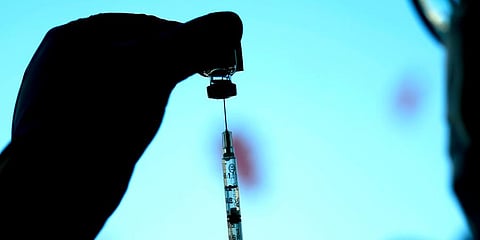

SINGAPORE: Singapore's COVID-19 patients who remain unvaccinated by choice will have to pay for their hospitalisation bills from December 8, the government said on Monday, as it got tough on people who are still holding off from getting their jabs.
The government currently foots the complete COVID-19 medical bills of all Singaporeans, permanent residents (PRs) and long-term pass holders, other than for those who have tested positive soon after returning from overseas travel.
On Monday, Health Minister Ong Ye Kung described the decision not to pay for unvaccinated people infected by COVID-19 an "important signal" to those who are still holding off on getting their jabs.
Speaking at a press conference held by the multi-ministry task force tackling COVID-19, which he co-chairs, Ong said hospitals would much prefer not having to bill these patients, as he urged all those eligible to get vaccinated.
"Currently, unvaccinated persons make up a sizeable majority of those who require intensive inpatient care, and disproportionately contribute to the strain on our healthcare resources," the Ministry of Health said.
The new billing measure applies only to those who choose not to be vaccinated despite being medically eligible, and who are hospitalised and are on COVID-19 treatment facilities on or after December 8, The Straits Times reported, citing the minister.
"Billing will still be based on our current subsidy framework, subject to MediSave use and MediShield Life claims, so it will still be highly supported and highly subsidised, Ong said.
MediSave and MediShield are linked to compulsory savings under the Central Provident Fund covering all employees.
Those who are ineligible for vaccination, such as children under 12 years of age, and those who cannot be vaccinated for medical reasons will continue to have their bills fully covered by the government, the ministry said.
Meanwhile, individuals who are partially vaccinated will not be charged for COVID-19 bills until December 31, to allow them time to administer their second jabs.
After this deadline, they will also have to foot their own medical bills if they contract the virus.
The authorities recognise that there are a few individuals who are medically ineligible for all COVID-19 vaccines under the National Vaccination Programme, according to The Straits Times report.
These individuals will be exempted from the vaccination-differentiated safe management measures from December 1.
On Sunday, Singapore reported 2,553 cases and 17 deaths.
The affluent city state has reported 218,333 positive cases.
Separately, an expert committee will make a recommendation on whether to extend the Pfizer-BioNTech Covid-19 vaccine to children aged five to 11 in the second half of November, Ong said.
The Minister's comments came after the United States Food and Drug Administration (FDA) recently authorised the use of the Pfizer vaccine for children in that age group.
Ong noted that the US FDA made its decision after Pfizer conducted a clinical trial and recommended that children in this age group receive one-third of the full adult dosage.
They will still get two separate doses.
"The study in the US concluded that vaccination for this group is safe and effective based on this reduced dosage of the adult formulation of the vaccine," he said.
Singapore's expert committee on COVID-19 vaccination has studied the data and assessed that overall, it is beneficial for children aged five to 11 to get vaccinated, especially given the ongoing community transmission, he said.
The Ministry of Health will also conduct a study with a few hundred children in this age group to understand the suitability of a smaller dosage of the vaccine for children here, the minister added.
The Health Ministry will also work out how to administer the vaccines smoothly before scaling up the drive, besides continuing to monitor the vaccines suitable for children aged four and below.